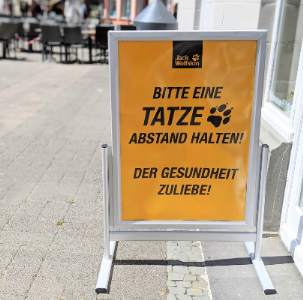Project Business Management
SERIES ARTICLE
By Oliver F. Lehmann
Munich, Germany
“This is a message to all the Davids out there
to stand up for what you believe in.”
― Shaun Snider, guitarist [1]

Summary
A common observation in project business is that organizations come together that are vastly different in size and in their ability to fight legal battles. This article addresses the side of the smaller player, and how it can avoid getting shattered in conflicts and finding itself as the losing party.
Things can become particularly crushing, when Goliath is a piece of artificial intelligence, a computer algorithm following an unknown set of rules.
Ruby Tuesday
“Ruby Tuesday” was a famous song by the British rock band “The Rolling Stones”, released in 1967. “Ruby Tuesdays” is also the name of an Australian rock band, which got sued in in July 2018 by a US-American fast food restaurant chain, name – you guess it – Ruby Tuesday, Inc. The Hamburger chain had about 540 locations, reportedly assets of USD929 Million and employed an expensive law office, while the rock band was reported to be “almost penniless”.[2]
The lawsuit alleged a copyright infringement by the rock band. It required them to hand over the band’s website URL, destroy merchandise, and pay a fee of USD2 million. [3]. Ten days later, the lawsuit was retracted by the fast food chain, which obviously found that it had no merits to further pursue its claims.

Figure 1: The company is very proud of its paw (German: Tatze) logo.
When they attack hobbyists, these feel rattled and the damage done
to their little businesses is enormous.
A similar story took place in 2009 in Germany. The outdoor cloth chain “Jack Wolfskin”, despite the name a German company, mandated their lawyers to send warnings (with attached cost note) to hobbyists, who had a small business selling home-made items over a web portal. The company’s complaint related to the use of what they considered their logo. It resembles an imprint of a wolf’s paw in mud or snow. It was registered as a trademark by the company in 1982, but similar paw symbols had been in use by many people over decades, not only in Germany. It was a popular signal for a sentimental and positive interest in animals, but the company said it felt obliged to go aggressively against everyone using it to “protect its brand”.
The company’s attack campaign mainly targeted micro businesses, such as pensionists, who had a small additional income with handcrafted jewelry, clothing, and fashionable accessories.[4] These businesses received injunctions with an invoice attached that was much higher than what many of these people had as yearly turnovers made from their small businesses.
There is a commonality in the two stories and many others, in which Individuals and small-scale businesses are struck by large organizations: People are shocked and rattled. Deeply rattled. The experience is frightening, and people feel helpless and devastated. They feel like biblical David, facing Goliath, the giant warrior may have felt, while commonly they don’t have means to defend themselves and stand their ground. Most of them would never willingly harm anybody, but now find themselves seemingly on the wrong side of law with expensive invoices to pay and threats to punish them further.
David and Goliath in Project Business Management
In project business, similar situations occur. The organizations that come together to do projects in a contractual setting are often different in their sizes and in the legal options that they can call upon when needed. Some are wealthy and can afford effective legal representation, others have difficulties to survive the day and are easily pushed out of balance when things go wrong.
More…
To read entire article, click here
Editor’s note: This series of articles is by Oliver Lehmann, author of the book “Project Business Management” (ISBN 9781138197503), published by Auerbach / Taylor & Francis in 2018. See author profile below.
How to cite this article: Lehmann, O. (2020). David, Goliath, and Artificial Intelligence in Project Business; Series on Project Business Management; PM World Journal, Vol. IX, Issue VIII, August. Available online at https://pmworldlibrary.net/wp-content/uploads/2020/07/pmwj96-Aug2020-Lehmann-David-v-Goliath-AI-PBM-series-article2.pdf
About the Author

Oliver F. Lehmann
Munich, Germany
![]()
Oliver F. Lehmann, MSc, ACE, PMP, is a project management educator, author, consultant, and speaker. In addition, he is the President of the Project Business Foundation, the home association for professionals and organizations involved in cross-corporate projects.
He studied Linguistics, Literature and History at the University of Stuttgart and Project Management at the University of Liverpool, UK, where he holds a Master of Science Degree. Oliver has trained thousands of project managers in Europe, USA and Asia in methodological project management with a focus on certification preparation. In addition, he is a visiting lecturer at the Technical University of Munich.
He has been a member and volunteer at PMI, the Project Management Institute, since 1998, and served as the President of the PMI Southern Germany Chapter from 2013 to 2018. Between 2004 and 2006, he contributed to PMI’s PM Network magazine, for which he provided a monthly editorial on page 1 called “Launch”, analyzing troubled projects around the world.
Oliver believes in three driving forces for personal improvement in project management: formal learning, experience and observations. He resides in Munich, Bavaria, Germany and can be contacted at oliver@oliverlehmann.com.
Oliver Lehmann is the author of the books:
- “Situational Project Management: The Dynamics of Success and Failure” (ISBN 9781498722612), published by Auerbach / Taylor & Francis in 2016
- “Project Business Management” (ISBN 9781138197503), published by Auerbach / Taylor & Francis in 2018.
His previous articles and papers for PM World Journal can be found here:
[1] (Thompson, 2018a)
[2] (Castrodale, 2018)
[3] (Thompson, 2018b)
[4] (Lischka, 2009)









